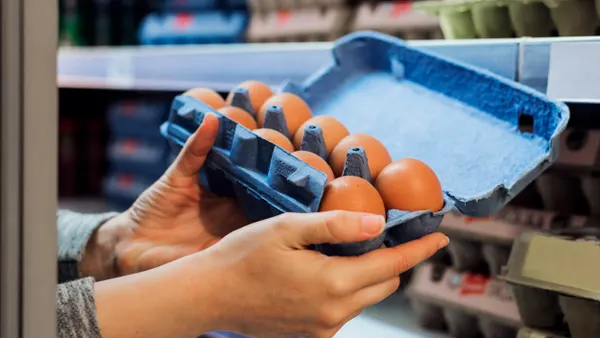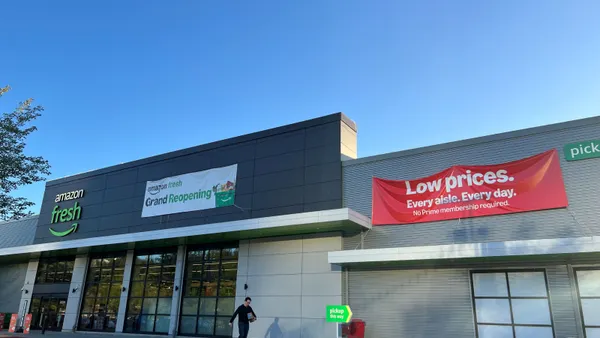Editor’s note: This story is the third installment in a monthly series looking at some of the biggest investments grocers and food companies are making. Previous articles sponsored by BMO Harris Bank can be found here.
With 9.6 billion people forecast to inhabit the planet in 2050, scientists have warned that population growth could lead to an unsustainable increase in food production if consumption patterns persist.
After years of hearing the cautionary tale, American consumers are now noticeably reducing consumption of food that is taxing on the environment. This behavioral change, coupled with the reality that shoppers and investors are increasingly looking for companies and brands focusing their attention on environmental issues, has led to the rise of alternative proteins that come predominately from plants and even bugs.
Thanks to social media, globalization and the increased popularity of flexitarian, vegan and vegetarian diets, a third of Americans last year said they wanted to "reduce their meat consumption and increase consumption of plant protein,” Lisa Feria, the CEO of animal welfare-focused venture capital firm Stray Dog Capital, said at a panel at South by Southwest earlier this month.
Most of this dietary evolution, she pointed out, is happening in younger generations. Feria said millennials are 12 times more likely than baby boomers to eat a plant-based diet.
This penchant for protein alternatives has led 17% of U.S. consumers to eat a predominately plant-based diet, and 60% of Americans claim to be reducing their consumption of meat-based products, according to HealthFocus data. Still, CB Insights estimated 30% of the calories we consume globally come from meat products. While there is an undeniable interest in sustainable alternatives to animal protein, people still like the taste of meat.
Not your typical burger
From beef-free burgers to pea-based chicken chunks, there are more plant-based meat options available than ever before. The products that are really shaking up the industry, according to SXSW panelists, are those that provide a bridge between real meat and plant-based creations.
“We’re looking for products which your average person will consume because it tastes amazing and it happens to be plant-based,” Andrew Ive, the managing director at Big Idea Ventures, said at the event.
The successes stories of Beyond Burger and Impossible Burger are ideal case studies for the potential growth of plant-based alternative proteins. When Impossible Burger appeared in 2016 and replicated the iron molecule heme in a lab, it was a quantum leap forward for the alternative-proteins space. Since then, the popularity of meat-like burgers made from plants has continued to grow.
In 2017, Impossible Burger was available at 50 restaurants nationwide. Today, it is in roughly 5,000 restaurants, and this year it's moving into retail where it will compete directly with Beyond Burger.
For its part, the Beyond Burger has become a staple at many grocery stores like Whole Foods, Kroger, Wegmans and Safeway. Some banners initially wanted to put the Beyond Burger in the frozen or the produce section where veggie products have long resided, but the company resisted because it was targeting meat-eating consumers.
“We fought the good fight with retailer," Charles Muth, Beyond Meat's chief growth officer, told Food Dive recently. “In every case, they’ve come around to our point of view and put us in the meat department. We had conviction about what we wanted to do and we stayed with it.”
Fish industry tries to capture growth
Following in the footsteps of these companies, animal protein imitators are now moving from bovines to aquatic life. Good Catch Foods, Terramino and Ocean Hugger are three companies that are shaking up the fish industry and beginning to command significant infusions of capital.
Last August, Good Catch Foods, which makes plant-based seafood alternatives, received $8.7 million in capital funding. Stray Dog Capital was among the investors. Good Catch recently introduced plant-based tuna at Whole Foods Market and Thrive Market outlets nationwide, making them the first two retailers to carry the shelf-stable product.
“(Seafood) is just such an underdeveloped market, so to have something that’s extraordinary, nutritious, delicious, you can disrupt an entire category — and no one has upended that boat yet,” Feria told Food Dive.
Although there is both demand and potential in the category, Feria noted there are price prohibitions that limit companies from grabbing significant market share from mass-produced animal proteins.
Currently, many plant-based proteins are priced as luxury items and the high cost can be a deterrent for some consumers to make the switch from their traditional meat options, Feria said. Other speakers at SXSW pointed to lab-grown meat as another potential protein solution for consumers, but one that to be truly viable, will need to be sold at a price point that's also attractive for the shoppers.
“(Seafood) is just such an underdeveloped market, so to have something that’s extraordinary, nutritious, delicious, you can disrupt an entire category — and no one has upended that boat yet.”

Lisa Feria
CEO, Stray Dog Capital
The global meat-substitutes market is projected to hit $5.2 billion in 2020, according to Allied Market Research. Seeing the change, CPG titans are investing to be a part of it. Tyson Foods, best known for its chicken, beef and pork, entered the space in 2016 by taking a 5% stake in plant-based company Beyond Meat before increasing its investment a year later. In 2017, Campbell Soup joined the Plant Based Foods Association, and Nestlé acquired Sweet Earth, a plant-based foods manufacturer based in California.
Even as consumers devour plant-based meat options, one category that seems to be struggling to gain traction is insects.
Too Creepy for Western consumers
Insects are a common source of protein in developing countries. In Brazil, insect consumption is predicted to surpass $55 million by 2023 while in Asia the market is expected to top $270 million by 2024, according to Global Marketing Insights. But in the U.S., it has proven to be harder to convince squeamish consumers that insects deserve a prominent place among the foods they eat each day.
“As a country, we’ve never experimented beyond the core food pyramid, we’re a little behind in (eating insects),” Phil Kafarakis, the president of the Specialty Food Association, told Food Dive.
Still, he noted that even if insect protein companies are having to battle traditional American food preferences, the insect industry cannot be ignored. Global Marketing Insights reported that from 2018 to 2024, the edible insect market will increase 43.5% to nearly $80 million in the U.S.
“As far as we’re concerned, they’re for real,” Kafarakis said.
In North America, crickets are the most popular edible insect out of the available options. Not only do crickets produce 100 times less greenhouse gas emissions than beef cow production, according to CB Insights, but they also taste good.
“Crickets are actually boring in the sense that they have great flavor and they’re crispy and crunchy. So it’s not like you have to take something that’s really, really inedible into something delicious,” Mohammed Ashour, the CEO of Aspire Food Group, told Food Dive.
Perhaps even better than taste, this environmentally friendly insect contains higher amounts of protein than both beef and chicken. It's also easier for the body to process than plant-based alternatives.
At Aspire, Ashour noted his company's sales have doubled each of the past two years and are on track to do the same again in 2019. Earlier this month, Texas-based grocer H.E.B put Aspire’s cricket paleo protein bites, bars and crispy crickets on its shelves. Canada’s largest grocer Loblaw also recently decided to launch cricket powder under its private label.
“I believe large grocers like H.E.B are responding proactively to a rapidly changing consumer. With more choice than ever, consumers are shifting their priorities and preferences far more quickly than most traditional retailers are able to adapt,” Ashour said. H.E.B is simply "getting with the times" and trying to stay ahead of these changes.
Dropping out of medical school
Although the growth potential of the insect industry in food is inevitable, some who follow the space remain skeptical. Feria said insect-based proteins are not worth the capital investment.
“I think to get consumers to eat it, particularly in Western countries, is an uphill battle, and so we think that other alternative proteins have so much potential that we don’t touch any of that,” she said.
Ivy expressed similar views on the panel. “I don’t believe that the average Western consumer is going en masse (toward insects),” he said. Instead, he was more interested in focusing on foods that could one day have wide appeal as a culinary staple in the Western diet.
“If I thought it was just a dream, would I really have dropped out of medical school and dedicated my life to making this a reality?”

Mohammed Ashour
CEO, Aspire Food Group
Ashour and Kafarakis disagreed, saying that sales of alternative proteins points squarely at future widespread use and adoption. Ashour even bet his future on the trend.
“If I thought it was just a dream, would I really have dropped out of medical school and dedicated my life to making this a reality?” he asked.
Despite remaining unconvinced by insects, the SXSW panelists all agreed that alternative proteins are here to stay. However, they pointed to one glaring gap that needs to be filled before their prediction can become a reality. Beyond hamburgers, products such as pork chops, deli meat and hotdogs — foods that people consume on a frequent basis — are all missing from the market.
Olivia Fox Cabane, the panel moderator and CEO of KindEarth.Tech, explained that the goal is to make alternative proteins another everyday option. “The day we meet (tractional protein options) on taste and texture and beat them on price, game over,” she said.
This series is brought to you by BMO Harris Bank, a leader in commercial banking. To learn more about their Food & Beverage expertise, visit their website here. BMO Harris Bank has no influence over Food Dive's coverage.













